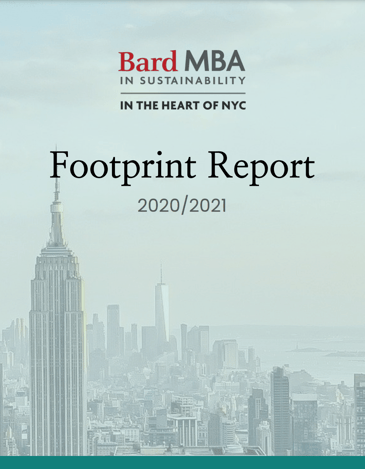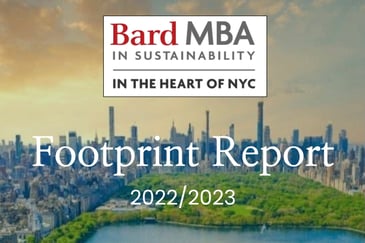Bard's MBA in Sustainability Goes Carbon Neutral

The Bard MBA has achieved its carbon neutrality goal, offsetting its emissions from the past three years as measured by the student-led Footprint Committee.
The Footprint Committee conducts an annual greenhouse gas inventory, including emissions related to student and faculty travel, accommodations, food, and waste, and estimated that since 2018 the program has generated approximately 200 metric tonnes of global warming pollution, roughly 75 metric tonnes per year. Beginning in 2020, the committee plans to expand the scope to include emissions related to energy use from buildings and technology, books, and set the foundation to measure social impact.
Bard MBA’s hybrid, low-residency structure (weekly online classes with one in-person residency a month) allows for students and faculty from across the country to participate in the program. This contributes to the shift of emissions burden from the built environment, which would be a major contributor in a traditional structure, to transportation, with 59 percent of Bard MBA’s emissions attributable to commuting to and from monthly in-person residencies.
The disruption caused by the COVID-19 pandemic in the latter half of the 2019-2020 school year reduced the program’s carbon footprint by approximately 33 percent as residencies were moved online and travel came to a halt. While residencies continue to be held online for the foreseeable future, the Footprint Committee decided it was time to analyze emissions related to technology usage and data storage.
“We’re excited to take this time to dive into the impact of online learning,” said Jordan Sabine, Co-Chair of the 2020-2021 Footprint Committee. “We will still project the footprint of our program as if we were meeting in-person for year-over-year comparability sake, but focusing our efforts on other aspects of our footprint will help us more fully understand our program’s full impact and develop more comprehensive reduction strategies.”
The program worked with Carbon Credit Capital, and the company’s Business Director (and Bard MBA alum) Reed Shapiro, to identify high quality carbon credits to offset the MBA emissions. The Footprint Committee chose to invest in the ADPML Portel-Para REDD project in Para, Brazil. This forest protection initiative avoids CO2e emissions and improves the livelihood of families in the local communities by providing jobs, health benefits, land ownership rights, and more.
The offset purchase was funded by an annual carbon offset fee introduced in 2020 of $30 per student.
This year the Footprint Committee plans to publicly publish the report for the first time. “Our hope is that other programs, institutions, and business, no matter what their size, are encouraged to look towards their own operational impact,” said Tessa Rainbolt, Co-Chair of the 2020-2021 Footprint Committee. “We are proud the hard work of the committee has set a baseline for Bard MBA’s offset initiative to begin. As we continue to learn best practices in GHG accounting, we expect our scope will become deeper and more refined, the important part is taking the first step.”
After-all, you can’t manage what you don’t measure.





